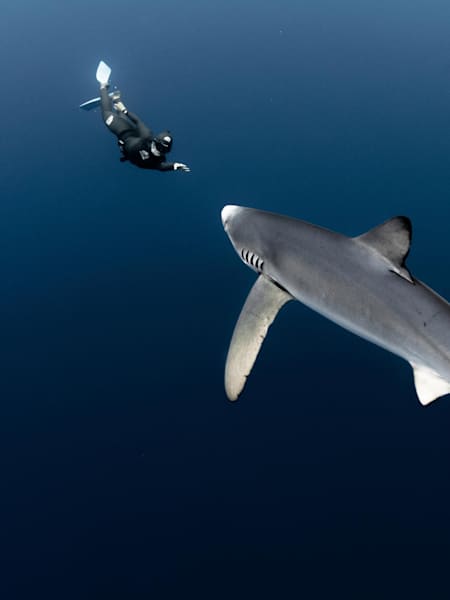French freedivers Alex Roubaud and Alex Voyer have a passion for diving in some of the world's most remote locations, capturing the incredible life that lurks beneath. From sharks to rays to leopard seals, which some say is the most dangerous predator in the ocean, the Paris-based pair believe that holding their breath is the best way to interact with sea life.
“Freediving leads us to see the world differently than a traditional scuba diver,” says Alex Voyer. “Freediving is probably the most environmentally friendly and most discreet way to approach any animal – in the water, in its environment. This approach gives a different perspective to underwater classical photos.
“We are also much more free in the water than with tanks on the back. We can perhaps not go as deep, but we can dive faster in all three directions. We can also stay much longer in the water – a trip can last three to four hours.”
The pair are based in Paris, which offers limited options for freediving. Although the shots here were taken from Antartica to the Azores, their trips are often closer to home, like on Brittany's coastline. “Our coasts are really beautiful," says Voyer, "but we try to go anywhere around the world to meet wonderful sea creatures that fascinate us.”
One of the attractions for freedivers is the sport's simplicity. All you need is a wetsuit, a mask and some fins. An ability to hold your breath is useful too. While the pair made a trip to Antarctica in 2013, they're also fans of warmer waters, such as those around the Maldives and the Azores, where the Alexes once dove with whale sharks, the largest fish in the world.
Humans are uniquely adapted to freedive. The so-called 'mammalian reflex' kicks in when we enter water and lowers our heart rate. This is essential for conserving oxygen and holding breath for long periods.
Another reflex that kicks in during a dive is 'vasoconstriction' when blood flow retreats from extremities like hands and feet to preserve vital organs. Professional freedivers can stay down for three to four minutes although most recreational dives are much shorter.
As serene and beautiful as it looks, freediving has the potential to be dangerous. In the last 10 meters of a dive, when the pressure difference is at its greatest, shallow water blackouts are not uncommon. Left alone, the result can be fatal. For this reason, freedivers will always buddy up.
“Freediving is not a dangerous activity, as we respect the elementary rules of safety, and diving with a buddy is the first and vital rule,” says Voyer. “We encourage anyone who wants to try free-diving to approach competent instructors, and never freedive alone.”
The Maldives is a diver's paradise. The chain of islands offers warm waters and abundant sea life. “We only use natural light and only our breath to shoot our photos,” says Voyer. “It is why there are not so many colours. But this is exactly how it was for us, seeing at this instant.”
A highlight for the guys was the freediving trip to Antarctica. The cold water provide plentiful sea life, including a unique chance to play hide and seek with a leopard seal. But this is no cute playmate. Leopard seals are the biggest predators in Antarctica and have a ferocious reputation.
“This was certainly the first freediving trip organised in Antarctica,” says Voyer. “We were living in a 52-foot sailing boat during one month to obserse all the differents animals living there. It was really impressive to dive in thoses waters surrounded by high mountains, so far from human civilization!”














